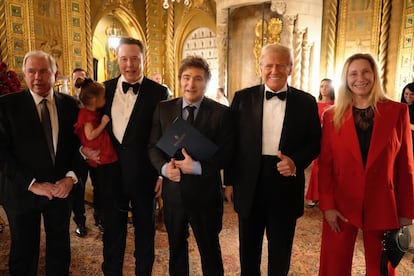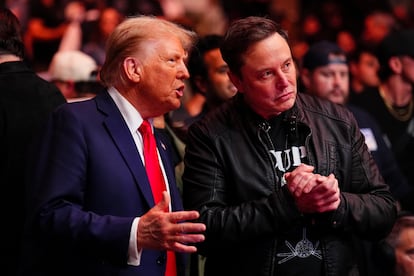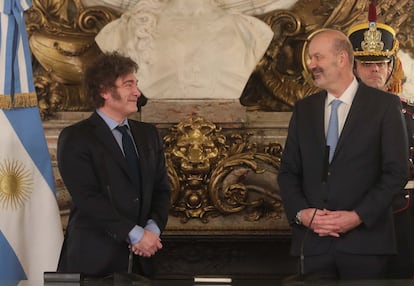How Javier Milei’s ‘chainsaw’ is inspiration for Elon Musk
Argentina’s Ministry of Deregulation and State Transformation is working to eliminate hundreds of departments and reduce bureaucracy. The minister is a self-professed admirer of the tech tycoon, who heads DOGE

The Argentine state’s government dismantling machine has its own ministry. It operates inside an Art Deco building from the 1930s with marble floors and stairs decorated with bronze. It was built in 1936 as the headquarters of the Shell oil company, and stands just a few blocks from the Casa Rosada, the president’s official workplace. It has the aura of “Argentina power” that the nation’s president, Javier Milei, has promised to bring back. By the year it was built, however, the agro-export model that Milei defends today was already dying. And soon Peronism would arrive in power, and with it everything that Milei considers wrong with his country: what he calls the “populist decadence” and the “oppressive state.”
Inside that same building, around a hundred officials now sit and think day after day about ways to reduce the size of the government and eliminate the bureaucracy that prevents “the operation of companies.” In little more than a year, Milei’s team at the Ministry of Deregulation and State Transformation has already shut down 250 national directorates, secretariats and undersecretariats, and left 40,000 government employees out of a job. Hundreds of laws, decrees and ordinances were also eliminated. The new president of the United States, Donald Trump, has taken a close look at the work of his Argentine counterpart. Inspired or not by his friend from South America, he ordered the billionaire Elon Musk to head a Department of Government Efficiency (DOGE). DOGE has offices in the White House and its stated goal is to dismantle bureaucracy, eliminate excessive regulations, cut unnecessary expenses and restructure federal agencies.
The Argentine model also promises to reduce spending. Helming the effort is Federico Sturzenegger, an academic who had a bitter stint as head of the Central Bank during the presidency of Mauricio Macri (2015-2019). Milei considers him a “colossus” and when he came to power, he asked for Sturzenegger’s help, first as an advisor and then as a minister. His second-in-command is Maximiliano Fariña, a young economist specializing in international trade. “There are exchanges,” the latter acknowledges when asked about the obvious “inspiration” that DOGE finds in the Argentine ministry. “The United States is going to start a path of transformation and Javier [Milei] is an international representative of that message. But I don’t know if the correct word is ‘advise.’ We are willing to share our experience and ideas with any ministry or country that requests it,” he says.

Elon Musk has said he intends to slash federal spending by around $2 trillion, about 30% of the federal budget. To do so, he has anticipated measures that include cutting subsidies to “progressive groups” such as Planned Parenthood, which offers abortion services, and the dismissal of officials in charge of enforcing climate change regulations. Trump, for his part, considers DOGE “the Manhattan Project of our time” and, on his first day in office, implemented one of the recommendations repeated tirelessly by Musk: requiring government employees to show up for in-person work, a move that he expects will lead to a “wave of resignations.”
The Argentine model has been in the works for over a year and can serve as a mirror to the American one, even though both countries are not comparable. The economist Hernán Letcher, director of the Center for Political Economy of Argentina, says that “what deregulation can mean in the United States is different than in Argentina, because Milei and Trump are not the same, they are not thinking about the same state.” The U.S. president, says Lechter, “clearly wants to defend local industry, while the Argentine president does not.” “What Trump intends is for U.S. companies to make money,” he insists, and for that reason he is threatening to impose tariffs and close borders.
Milei’s model is a minimal state that frees up resources for the private sector. The debate is on the limits of this cut. Milei assures that his final objective is to “do away with the state from within,” even if that means affecting areas such as health and education. Fariña evaluates the dimension of the adjustment: “We do not set a goal without knowing the reality, it is not about reducing for the sake of reducing. We are in a process of reviewing area by area, in a continuum that we started a few months ago. As we advance, we are closing agencies, and that will take time. The chainsaw still has a long way to go,” says the vice minister.
But the chainsaw — Milei sometimes campaigned with a power tool in hand to show that he was ready to aggressively tackle the system — has already left thousands of victims in its wake, without society seeming to pay much attention to them. The change of mood is evident: in the popular imagination, it has become an established fact that government employees receive their salary without doing any work, and that the state holds people back from personal development. “We are bringing what society asked for and wants: a smaller state that does not interfere in their lives,” says Fariña.
The downsizing process is rather bureaucratic. “The first few months were spent chainsawing in departments that clearly didn’t make any sense, or where there were 2,000 people, and you didn’t know what they were there for. Now we’re starting what we call the deep chainsaw, where we’re going area by area to review how employees are working.” As an example, he mentions the offices dedicated to regulating tourism: “We had a travel agency department, a national agency for controlling travel agencies and a travel agency registration department. All for a task that is now done by private companies.”

The elimination of regulations, on the other hand, is more artisanal. “In the first stage we created an email address, the same one used by the minister, and we asked people through social media to write to us about the regulations that hinder them in their work. There was a great response,” explains Fariña. When the minister’s email address became clearly insufficient, an online platform was created. “In less than 15 days we received more than 8,000 complaints. A team of 40 people, made up of economists and lawyers, takes these complaints, segments them with artificial intelligence and meets with each of the ministries to see how to eliminate these barriers. It is a small government where we all have the same vision, so the capacity for resolution is fast. There are very small changes that get resolved in 48 hours, and other very large ones, such as the navigation regime, which can take one or two months,” says the vice minister.
Whether Musk will adopt the Argentine model or not remains to be seen. For the moment, Milei and Musk have done nothing to conceal their friendship and mutual admiration. Musk was announced by Trump as head of DOGE on November 12, just a week after his re-election. That same day, Milei confirmed that Musk was holding “conversations with Federico Sturzenegger to see how to deregulate the American economy.” Sturzenegger, the Minister of Deregulation, is also an admirer of Musk, whom he describes as an “absolutely extraordinary character,” and has proudly stated that Trump “was inspired” by Javier Milei to create DOGE.
It is a scenario where everyone seems to have something to gain. Musk, founder and director of Tesla, is interested in Argentina’s large reserves of lithium, a mineral used for the batteries of his electric cars. “Elon Musk called me, and he is extremely interested in lithium. And the United States government is also very interested,” Milei said in December. The president immediately put the spotlight on the regulations that, until now, have hindered the development of mining activity in Argentina.
Sign up for our weekly newsletter to get more English-language news coverage from EL PAÍS USA Edition
Tu suscripción se está usando en otro dispositivo
¿Quieres añadir otro usuario a tu suscripción?
Si continúas leyendo en este dispositivo, no se podrá leer en el otro.
FlechaTu suscripción se está usando en otro dispositivo y solo puedes acceder a EL PAÍS desde un dispositivo a la vez.
Si quieres compartir tu cuenta, cambia tu suscripción a la modalidad Premium, así podrás añadir otro usuario. Cada uno accederá con su propia cuenta de email, lo que os permitirá personalizar vuestra experiencia en EL PAÍS.
¿Tienes una suscripción de empresa? Accede aquí para contratar más cuentas.
En el caso de no saber quién está usando tu cuenta, te recomendamos cambiar tu contraseña aquí.
Si decides continuar compartiendo tu cuenta, este mensaje se mostrará en tu dispositivo y en el de la otra persona que está usando tu cuenta de forma indefinida, afectando a tu experiencia de lectura. Puedes consultar aquí los términos y condiciones de la suscripción digital.








































